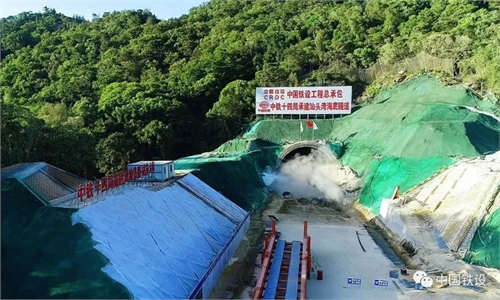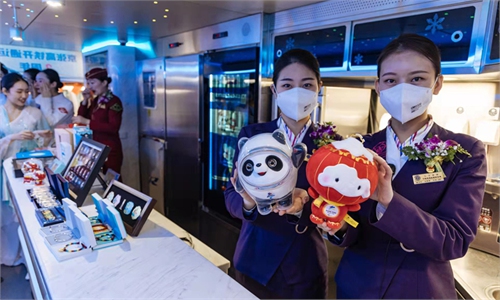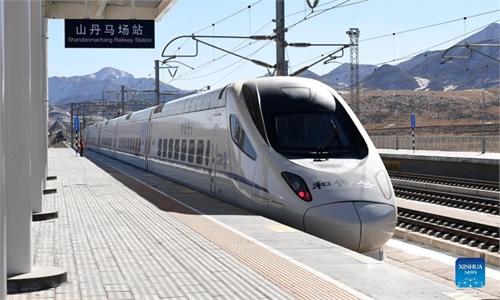China unveils brand new, state-of-the-art train to serve Beijing Winter Olympics
'Calling card' in home court to impress athletes, other guests
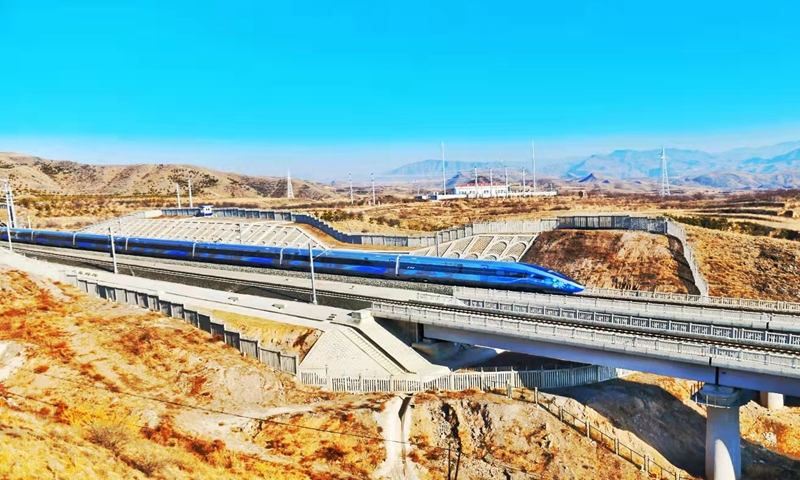
China unveils a new Fuxing bullet train on January 6, 2022, to serve the Beijing 2022 Winter Olymics. Photo: VCG
China has unveiled a brand new, state-of-the-art Fuxing bullet train, said to be the world's first intelligent and autonomous high-speed train with a top speed of 350 kilometers per hour and a 5G live broadcast studio on board, to serve the upcoming Beijing Winter Olympics.
The demonstration of the train's new technologies to athletes and guests from around the world during the Beijing Games scheduled for February 4-20 will be a definite boon to the profile of China's high-speed railway (HSR) system, one of the crown jewels of Chinese industrial achievements, said a senior designer of the advanced electric multiple unit (EMU).
One of the unique characteristics of the EMU is that it has a live broadcast studio that could transmit ultra-high-definition content via 5G connections. The installation, which is one of the first on the world's fastest trains, will bring convenience to global media professionals covering the event.
"To have so much advanced technology brought together on this train, and to present it in front of the world, this shows China's comprehensive strengths in terms of the train system, and will definitely boost the exports and go abroad efforts of the EMU system," Zhu Yan, deputy director with Engineering Research Center of CRRC Changchun Railway Vehicles Co, the train's maker, told the Global Times on Thursday.
By using new materials and technologies, as well as an eagle-shaped nose chosen out of over 40 designs, the EMU has lower wind resistance and weighs less. These traits make it a green EMU that's 10 percent more energy-efficient than previous generations, saving 1.8 million kilowatt hours of electricity per year.
With the help of the latest communication hardware, cameras and sensors, the train can scan up to 14 kilometers ahead to probe for any abnormal intrusions on the tracks, according to Zhu.
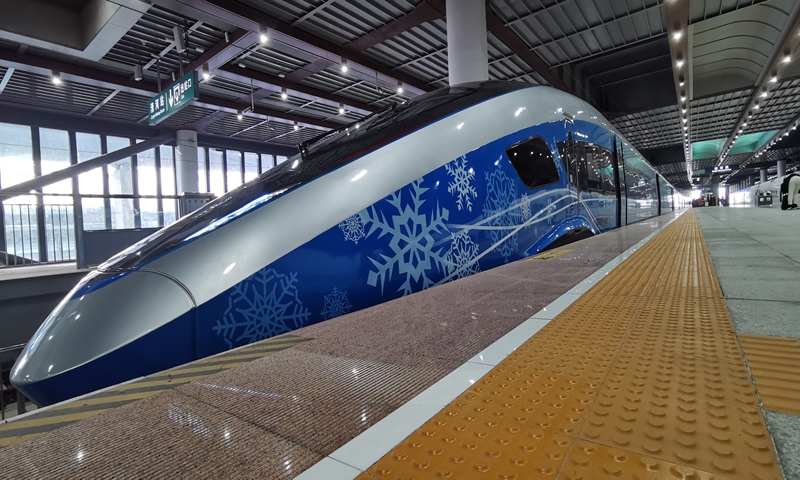
China State Railway Group Co launches the 5G express Fuxing bullet train designed especially for the 2022 Winter Olympics on January 6, 2022. Photo: Courtesy of China State Railway Group Co
The eight-car EMU can carry 564 people, though it will serve no more than half that many during the Beijing Games as part of the epidemic control efforts, according to China State Railway Group Co, the state-owned railway operator.
China has exported its high-speed rail technologies to Indonesia for the Jakarta-Bandung high-speed railway. Construction of the railway has been progressing smoothly and approaching completion.
A number of other countries, including Laos, also use Chinese-made trains, though these types travel at lower speeds.
This new generation of smart EMUs also stands a good chance of upgrading China's existing domestic bullet train fleet, the world's largest, numbering at 4,000.
China is the world's superpower in terms of high-speed rail technology. The country has 40,000 kilometers of high-speed rail lines and plans to build another 1,400 kilometers by the end of 2022, according to media reports.
The railway between Beijing and Zhangjiakou in North China's Hebei Province is where China's railway industry started and the development of this railway resembled the development process of Chinese railways.
In 2019, on the 110th anniversary of China's first railway, China's first EMU equipped with smart technologies was unveiled on this section, ushering in a new era of strength-building in China's transportation industry.
Sun Zhang, a mass transit expert and professor at Shanghai Tongji University, pointed to one special bonus in that Beijing and Zhangjiakou have linked up all the game venues, from indoor ice sports stadiums in the city of Beijing to outdoor ski resorts in the suburb of Yanqing and those in Hebei Province, with a carefully knitted web of subways, intracity railways and high-speed railways that enable people to travel in a time-efficient manner.
"Needless to say, such a sincere calling card will be impressive to guests, dignitaries and athletes participating in the Beijing Games," Sun told the Global Times on Thursday.

